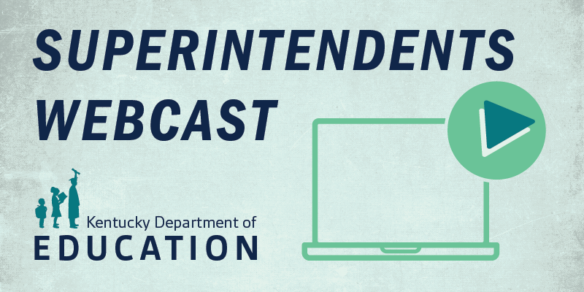 Kentucky superintendents heard updates on a recent resolution the Kentucky Board of Education (KBE) passed supporting public funds for public schools, along with KBE priorities and continued efforts to reform the state’s assessment and accountability systems during the Superintendents Webcast on Oct. 10.
Kentucky superintendents heard updates on a recent resolution the Kentucky Board of Education (KBE) passed supporting public funds for public schools, along with KBE priorities and continued efforts to reform the state’s assessment and accountability systems during the Superintendents Webcast on Oct. 10.
On Oct. 7, KBE members unanimously approved a resolution supporting the use of state dollars to exclusively fund the common system of public schools.
“We believe that it upholds our beliefs that the best way to ensure all students in Kentucky receive a high-quality education is by supporting the existing public education system,” Fletcher said to superintendents.
The Kentucky Constitution currently prohibits public dollars from going to a school system outside of the Commonwealth’s common system of public schools. Fletcher said if that prohibition is removed, it may open a number of possibilities, including funding concerns and issues with how different types of schools are assessed.
“We want to make sure that we have the same type of opportunities for all students,” he said.
Fletcher said KDE works well with the Kentucky General Assembly on funding and education policy and will continue to do so.
Assessment and Accountability
The Kentucky Department of Education (KDE) and the Kentucky United We Learn Council have been working on prototypes for reimagined assessment and accountability systems that will prioritize innovation, personalization, local community and student voice, and the incorporation of vibrant learning experiences.
Meredith Brewer, KDE director of education policy, provided an update to superintendents on where the work stands.
KDE is now in the study phase of the most recent assessment and accountability prototype, which involves seeking input from all districts through Kentucky’s education cooperatives and conducting focus groups with 36 school districts. KDE also received 640 responses to an assessment and accountability prototype stakeholder feedback survey from the larger education community in Kentucky.
KDE innovation specialists also have been working with districts to gather information about how prepared they are to implement a vibrant learning experiences indicator as part of a new assessment and accountability system. Brewer said the goal is to have all 171 Kentucky school districts involved with that process.
Fletcher said he appreciates the work Kentucky superintendents and others in the education community have already done to provide input on a reimagined assessment and accountability system.
“I believe that we can do better when it comes to accountability than what we’re doing now, and I think the data that we’re getting back from you and from everybody across our districts feels the same way also,” Fletcher said.
The next Kentucky United We Learn Council convening is Oct. 21-22, and members will be diving deep into data they have received through feedback. Brewer said the goal is to have a prototype for Kentucky United We Learn Council members to formally endorse during a virtual meeting in November.
Following that endorsement from the Kentucky United We Learn Council, Brewer said the plan is to present the final prototype to the Local Superintendents Advisory Council and KBE in the final weeks of 2024.
Ultimately, she said a finalized assessment and accountability proposal will be developed for the Kentucky General Assembly to consider as early as the 2026 legislative session.
“It is an aspirational timeline, but we do think it is feasible,” Brewer said.
KBE Goals and Legislative Priorities
Brian Perry, KDE director of government relations, informed superintendents about a list of legislative priorities that were approved by the KBE during its meeting on Oct. 7-8.
The top priority for board members is to support the work of the Kentucky United We Learn Council in its efforts regarding the state’s assessment and accountability systems.
Another priority for the board is to secure funding for several key initiatives and programs, including professional development associated with the Kentucky Numeracy Counts Act (House Bill 162 (2024)), literacy coaches for the Read to Succeed Act (Senate Bill 9 (2022)) and additional funding to implement high-quality instructional resources.
Teacher recruitment and retention efforts also were among the priorities, along with funding for universal preschool, full-day kindergarten and school safety.
KBE members also signed off on a list of goals for themselves: to foster vibrant learning experiences, advance educational innovation and excellence and cultivate collaborative partnerships.
The full list of priorities can be found on the Kentucky Board of Education website.
Other updates to superintendents included:
- The KDE Office of Career and Technical Education informed superintendents about an important funding deadline: Technical Education Database System (TEDS) attend hours data must be entered and uploaded by Nov. 15 for students enrolled in career and technical education (CTE) pathways in Term 1 (fall 2024). More details were shared in the Oct. 7 edition of the Commissioner’s Monday Message.
- Fletcher informed superintendents about a customer service survey that will be headed their way in the next month, seeking feedback on how KDE is serving Kentucky schools.




Leave A Comment